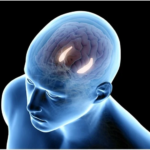How the hippocampus distinguishes true and false memories
The hippocampus is a region of the brain largely responsible for memory formation.
Let’s say you typically eat eggs for breakfast but were running late and ate cereal. As you crunched on a spoonful of Raisin Bran, other contextual similarities remained: You ate at the same table, at the same time, preparing to go to the same job. When someone asks later what you had for breakfast, you incorrectly remember eating eggs.
This would be a real-world example of a false memory. But what happens in your brain before recalling eggs, compared to what would happen if you correctly recalled cereal?
In a paper published in Proceedings of the National Academy of Sciences, University of Pennsylvania neuroscientists show for the first time that electrical signals in the human hippocampus differ immediately before recollection of true and false memories. They also found that low-frequency activity in the hippocampus decreases as a function of contextual similarity between a falsely recalled word and the target word.
“Whereas prior studies established the role of the hippocampus in event memory, we did not know that electrical signals generated in this region would distinguish the imminent recall of true from false memories,” says psychology professor Michael Jacob Kahana, director of the Computational Memory Lab and the study’s senior author. He says this shows that the hippocampus stores information about an item with the context in which it was presented.
Researchers also found that, relative to correct recalls, the brain exhibited lower theta and high-frequency oscillations and higher alpha/beta oscillations ahead of false memories. The findings came from recording neural activity in epilepsy patients who were already undergoing invasive monitoring to pinpoint the source of their seizures.
Noa Herz, lead author and a postdoctoral fellow in Kahana’s lab at the time of the research, explains that the monitoring was done through intracranial electrodes, the methodology researchers wanted to use for this study. She says that, compared to scalp electrodes, this method “allowed us to more precisely, and directly, measure the neural signals that were generated in deep brain structures, so the activity we are getting is much more localized.”
Subjects studied a list of unrelated words and were distracted before being asked to remember words, says Herz, now an assistant professor of neurology at Thomas Jefferson University, in Philadelphia. Researchers analyzed patterns of electricity generated in the hippocampus, capturing brain activity leading up to correct or false recall.
Beyond the distinction between true and false memories, researchers predicted that activity in the hippocampus would reflect the degree of similarity between the correct and false memory. They indeed found that a notable reduction in low-frequency activity was associated with greater similarity between the contexts in which false and correct items were learned.
A similar context in this study meant a patient recalling a word from a prior list in the experiment instead of the target list, whereas a different context is recalling a word that was never part of the experiment.
“The words were presented when the patient was sitting in the same room, looking at the same computer, having the same experimenter next to him,” Herz says, “and these words were also presented more recently in time, so all of these different factors mean that prior list intrusions should be more similar, in terms of the context in which they were presented, to the correct target list.”
This was a way of testing hippocampal response to different words presented from similar source contexts, but what happens in the brain when someone recalls a word that is incorrect but semantically similar to the right word? Researchers tested this, too.
They showed patients words in three categories, such as flowers, fruits, and insects. As an example, Herz says if the list includes “rose” and “lily” but a person recalls “sunflower,” that is semantically similar whereas saying “clock” is not. But perhaps “clock” was on a prior word list in the study; the paper notes a recalled word tends to be similar in at least one context, either source or semantic.
As hypothesized, researchers found the same brain pattern with semantic similarity as they did with source similarity: a reduction in hippocampal low-frequency activity.
Herz says the overall findings deepen the understanding of how the brain enables memory retrieval, and the authors note that predicting false memories at a single-subject level is particularly important when false recalls cause distress.
“Individuals suffering from stress-related psychopathology, such as post-traumatic stress disorder, often experience memory intrusions of their traumatic experiences under contexts that are safe and dissimilar to the traumatic incident. Targeted interventions that disrupt retrieval of intrusive memories could spawn novel therapies for such clinical conditions,” the researchers write.


